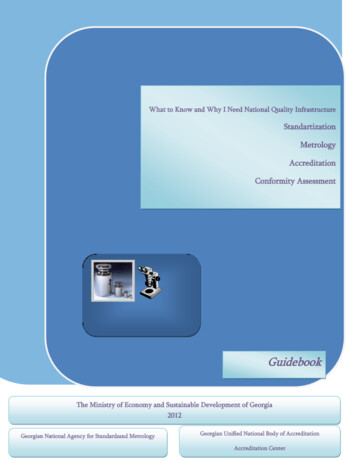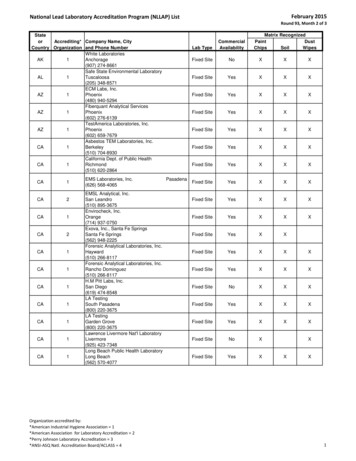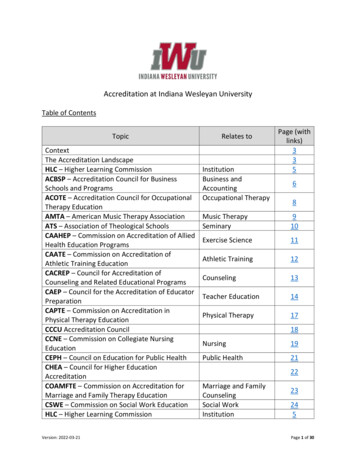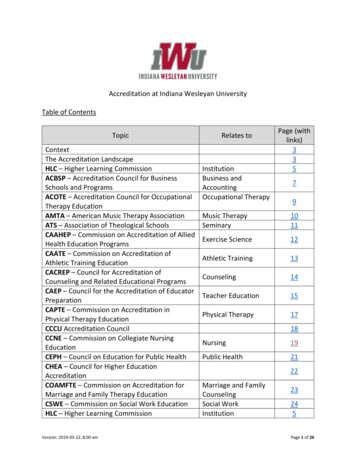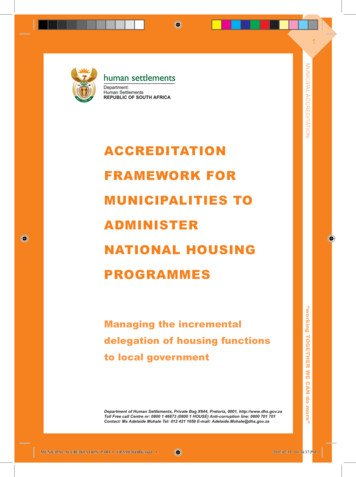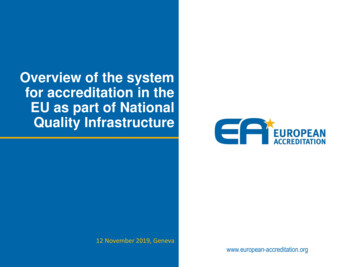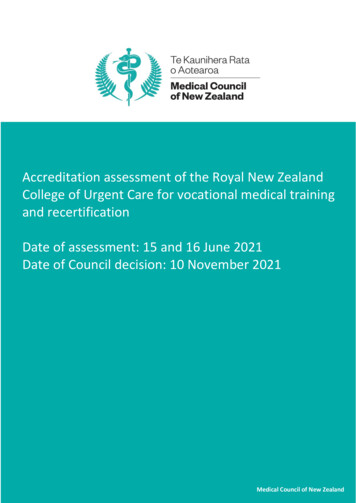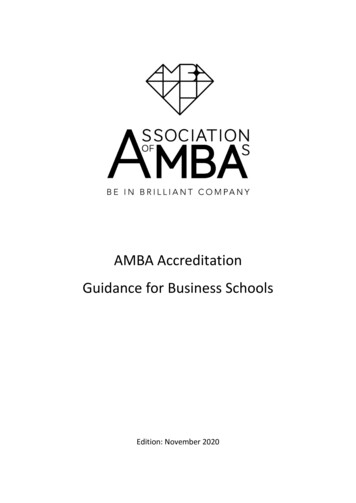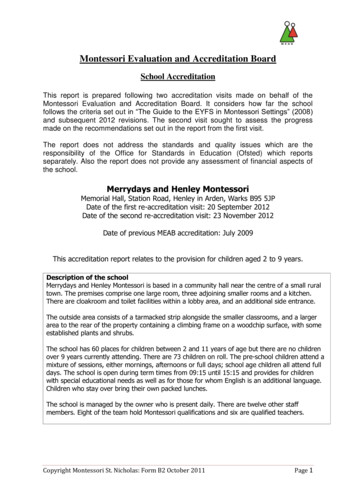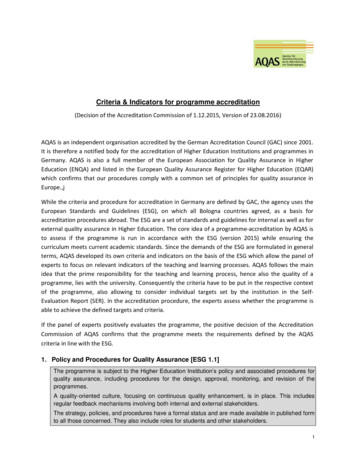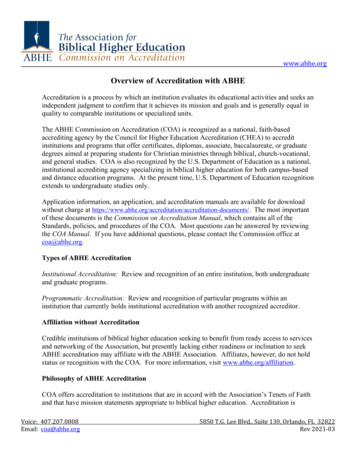
Transcription
Overview of Accreditation with ABHEwww.abhe.orgAccreditation is a process by which an institution evaluates its educational activities and seeks anindependent judgment to confirm that it achieves its mission and goals and is generally equal inquality to comparable institutions or specialized units.The ABHE Commission on Accreditation (COA) is recognized as a national, faith-basedaccrediting agency by the Council for Higher Education Accreditation (CHEA) to accreditinstitutions and programs that offer certificates, diplomas, associate, baccalaureate, or graduatedegrees aimed at preparing students for Christian ministries through biblical, church-vocational,and general studies. COA is also recognized by the U.S. Department of Education as a national,institutional accrediting agency specializing in biblical higher education for both campus-basedand distance education programs. At the present time, U.S. Department of Education recognitionextends to undergraduate studies only.Application information, an application, and accreditation manuals are available for downloadwithout charge at ocuments/. The most importantof these documents is the Commission on Accreditation Manual, which contains all of theStandards, policies, and procedures of the COA. Most questions can be answered by reviewingthe COA Manual. If you have additional questions, please contact the Commission office atcoa@abhe.org.Types of ABHE AccreditationInstitutional Accreditation: Review and recognition of an entire institution, both undergraduateand graduate programs.Programmatic Accreditation: Review and recognition of particular programs within aninstitution that currently holds institutional accreditation with another recognized accreditor.Affiliation without AccreditationCredible institutions of biblical higher education seeking to benefit from ready access to servicesand networking of the Association, but presently lacking either readiness or inclination to seekABHE accreditation may affiliate with the ABHE Association. Affiliates, however, do not holdstatus or recognition with the COA. For more information, visit www.abhe.org/affiliation.Philosophy of ABHE AccreditationCOA offers accreditation to institutions that are in accord with the Association’s Tenets of Faithand that have mission statements appropriate to biblical higher education. Accreditation isVoice: 407.207.0808Email: coa@abhe.org5850 T.G. Lee Blvd., Suite 130, Orlando, FL 32822Rev 2021-03
granted to institutions that satisfactorily demonstrate substantial compliance with the COA’sConditions of Eligibility and its Standards for Accreditation. Although accreditation signifiessubstantial compliance with the Association Standards, it is designed to foster ongoingsystematic self-study with the goal of continuous institutional improvement. ABHE accreditedinstitutions are expected to validate mission (and update as needed); examine evidence for theachievement of the mission and goals; identify areas of strength and weakness; and developplans to address issues identified. The ultimate goal of this process is to better equip institutionsto prepare students for a life of service to the glory of our Lord Jesus Christ.Stages of ABHE AccreditationThe following information highlights elements of the accreditation process and is not intended tobe a comprehensive description. Additional detail is found in the COA Manual, available -documents/. Note especially the Policy andProcedures for Institutional Accreditation.1. Applicant statusApplicant status is granted to institutions that meet the COA Conditions of Eligibility andevidence the potential to achieve candidate status within a maximum of five years.An institution desiring applicant status with the COA should contact the Commission office toschedule a one-day consultation visit by a member of the Commission’s professional staff to theinstitution’s campus. This preliminary consultation visit is required and must be completedduring the 24 months prior to submission of an application. The purpose of the visit is to assistthe institution in understanding the accreditation process and conduct a preliminary assessmentof the institution’s achievement of the Conditions of Eligibility.The Commission considers applications on a rolling basis as follows:December 15 deadline for February Commission reviewMay 15 deadline for June Commission reviewSeptember 15 deadline for November Commission reviewAfter the preliminary consultation visit, the institution should submit one electronic copy (pdf) ofthe following documents to coa@abhe.org for consideration:1. A completed ABHE application form2. An official letter from the chief executive officer stating the board of control’s desire forthe institution to pursue accreditation with the Commission3. A copy of the ABHE Tenets of Faith form signed by the chief executive officer,reflecting evidence that the institution’s board of control affirms agreement with andcommitment to the tenets (required annually)4. A document demonstrating compliance with the Conditions of Eligibility. The documentshould describe the institution’s compliance with each requirement and providedocumentation of compliance in appendices at the end of the narrative.2
A check for the application fee should be sent by postal mail when the application issubmitted.The Commission’s Committee on Applicant and Candidate Status (APCAN) will review thesematerials, and the COA will determine whether to grant or deny applicant status or defer action.An institution must substantially meet the Conditions of Eligibility and evidence the potential toachieve candidate status within a maximum of five years to be granted applicant status. Aninstitution denied applicant status must wait one year before reapplying. An institution mayvoluntarily withdraw its request for applicant status, without prejudice, at any time prior to thedecision of the COA.Once granted applicant status, an institution must annually demonstrate timely progress towardcandidate status. To support this expectation, an annual consultation visit by a member of theCOA professional staff is required. The institution must also complete an online annual reportand submit an annual progress report, final external financial audit with auditor’s managementletter, and academic catalog(s) for review by the COA.During the first year of applicant status, the institution is expected to send one or morerepresentatives to the Achieving Accreditation Standards Conference (new applicant orientation).The orientation is a two-day, small-group workshop lead by COA staff to help institutionsunderstand the expectations and common understanding of the Standards and Essential Elementswithin each Standard. Each of these will be reviewed during the workshop, and participants willcomplete an initial self-assessment of the institution’s compliance with the Standards/EssentialElements as a baseline for determining where energy needs to be invested in the coming years.The format of the workshop provides a question-answer component with each Standard, andopportunity for institutions to share their experiences and challenges to help one another progresstoward accreditation as rapidly and effectively as possible. The cost of the workshop is partiallyunderwritten to encourage institutions to send the primary people who will be working onaccreditation (the accreditation team), rather than just one representative.In November of the third year of applicant status, the institution prepares and submits a selfstudy for review by the COA. This rigorous self-analysis consists of (1) a compliance document(normally not exceeding 100 pp. text plus exhibits) analyzing and documenting the extent towhich the institution meets the Standards and Essential Elements; (2) an assessment plandescribing systematic and ongoing assessment processes to evaluate student learning andinstitutional effectiveness; (3) an institutional improvement plan showing how the institutionplans to address weaknesses or take action to advance quality performance outcomes and/or meetABHE Standards; and (4) a brief statistical abstract overviewing the most recent four-year trendin enrollment, library, finances, and other data. The COA reviews the self-study at the followingFebruary meeting.If the institution’s self-study shows sufficient progress to warrant a team review, an evaluationteam will be authorized by COA to conduct a three-day visit to the institution in the upcomingfall. This five-member team will interview various personnel (including faculty, board, andstudents), examine documents, and submit a report for review by the institution and the COA.The institution is expected to provide a response to the evaluation team report, indicating steps3
taken or to be taken to address areas where the team found compliance with the Standards andEssential Elements has not been adequately demonstrated.The COA will review these documents and interview institutional representatives at the FebruaryCOA meeting before making a decision on candidate status. This review by COA isapproximately 15 months after initial submission of a self-study.2. Candidate StatusCandidate status is granted to institutions that have been reviewed by an evaluation team anddetermined by the COA to be making sufficient progress as to achieve accreditation within amaximum of five years.The process for candidate institutions is virtually identical to that of applicant institutions, but theexpectations are at a higher level. Candidate institutions will prepare annual reports and host staffvisits to assist the COA in evaluating annual progress toward initial accreditation. In November ofthe third year of candidate status, the institution will prepare and submit a second self-study forreview by the COA. If approved, the institution will host a visiting team for initial accreditation inthe coming fall, and appear before the COA in February of the next year for consideration of initialaccreditation.Where review for candidate status looked at whether or not the institution showed promise ofsubstantial compliance with all Standards and Essential Elements, the review for initialaccreditation carries the expectation that substantial compliance will be fully achieved by the timeof this review.Accelerating or Decelerating the ProcessThe COA strongly recommends that institutions plan for a four-year progression from applicant tocandidate status and from candidate status to initial accreditation—saving the fifth year as acontingency to accommodate any unexpected delays that may occur. Where an institution is notready for candidate status or initial accreditation, the COA may defer action to give the institutionan additional year to address concerns, but only where a contingency year is available. If aninstitution fails to achieve the next level of accreditation status (candidate or initial accreditation)within five years, the COA must remove the institution’s current status, and the institution mustwait at least one year before seeking reinstatement; therefore, the contingency year should bereserved for unexpected crises that might make delay in the process unavoidable.Nearly all institutions seek to accelerate the process, but for most institutions, the processrealistically takes four years from application to candidate status and four years from candidatestatus to initial accreditation. An institution must document that it meets both the overallStandards as well as all of the Essential Elements within each Standard to pursue a shortertimeline. When the institution can do that, it must submit a written request for acceleration and aprogress report documenting satisfaction with the Standards and Essential Elements. This will bereviewed by the APCAN to determine whether or not progress is sufficient to warrant authorizingsubmission of a self-study early. The COA does not wish to obligate an institution to the cost and4
time involved in a self-study and evaluation team visit unless the prospect of a successful visit islikely. A suggested timeline is attached to assist institutions in planning.3. Accredited StatusAccredited institutions submit to periodic review as part of their recognition. The institution’sfirst review after initial accreditation will be in 5 years (4th year for team visit, COA review at 5thyear anniversary), and at a minimum, every 10 years thereafter. Certain changes (addingprograms, additional locations, etc.) are significant enough that institutions must submit asubstantive change proposal for COA review, and some changes require a staff or focused teamvisit for verification.ExpensesExpenses related to pursuit of accreditation take three forms: (1) direct expenses paid to ABHEfor membership dues and accreditation services, (2) indirect expenses for institutional personneldevoting time to preparations for accreditation, and (3) expenses for professional development(ABHE annual meeting, workshops on accreditation, etc.) and private accreditation consultants(if so desired) to assist in developing policies, materials, and processes needed for accreditationreview. The institution’s budget should reflect the investment in accreditation services. Acurrent fee schedule is attached to help institutions project expenses for COA services andABHE membership dues.While this fee schedule is subject to change, a small institution should anticipate 8,000- 9,000per year for ABHE dues and staff consultation visits, plus an additional 9,000 during the year ofan evaluation team visit. Larger institutions pay more in dues (up to 4,950 additional dues).Indirect expenses are dependent on the capacity of current personnel to absorb additionalresponsibilities related to accreditation. If capacity is at maximum, the institution shouldanticipate the equivalent of one additional full-time person (with workload spread across variousindividuals and committees) to engage the process. Expenses for professional development andconsultants are dependent on the level of assistance needed and may range from 1,000 per yearfor limited professional development to 12,000 or more for a consultant offering monthlyservices.Resources for the JourneyCommission on Accreditation Manual – complete record of ABHE Standards for Accreditation,policies and procedures. The Manual should be your first stop in looking for answers aboutABHE accreditation. Available as a free download -documents/.Self-Study Guide – a step-by-step guide to the preparation of a self-study and hosting anevaluation team visit. The Self-Study Guide suggests strategies, processes, and organization tomake the preparations for a team visit easier. Available as a free download -documents/.5
Evaluation Team Handbook – intended primarily for evaluators, this tool can be a helpfulreference in understanding what teams are instructed to look for when conducting an on-sitevisit. Available as a free download at ocuments/.Team training videos are also available to the public at raining/.Accreditation Journey Conference – a two-day workshop (usually late Sept.) intended forinstitutions interested in starting the accreditation process or those that have recently engaged theprocess. The conference is organized with time built in for presentations, questions, anddiscussion in a small-group setting (10-20 people from institutions with similar accreditationneeds and desires). ABHE also hosts similar two-day workshops for leaders in specific roles(e.g., president, academic dean, enrollment management, development). All fall conferences areheld at the ABHE Headquarters, one mile from the Orlando International Airport.Achieving Accreditation Standards Conference – a two-day workshop held at ABHEHeadquarters in Orlando (May or June) for new applicants and institutions approaching areaffirmation review to assist in preparation for conducting a comprehensive self-study. Theconference will include an overview of all 11 ABHE Institutional Accreditation Standards, alongwith the Essential Elements that must be met to satisfy each standard. The presentationdiscussion format provides opportunity for participants to explore situations at their institutionsand seek advice from the ABHE professional staff and senior evaluators on how to address thosesituations in the context of the standards. A self-assessment opportunity will be included todevelop a working agenda for addressing areas that need improvement before hosting anevaluation team. This conference is required for new applicants during the first year of applicantstatus.ABHE Annual Conference – the premiere gathering of 400 leaders engaged in biblical highereducation. The February conference in Orlando offers plenary sessions around a central theme,concurrent workshops organized into multiple professional tracks, fellowship times to networkwith other ABHE institutions with mutual interests, pre-conference workshops and trainingopportunities for more in-depth professional development, and an exhibit hall to exploreresources and services across the spectrum of institutional operations.For information on conferences, please visit lopment-conferences.6
ABHE Tenets of FaithAccording to the Constitution of the Association for Biblical Higher Education, the followingstatement of faith is to be subscribed to annually by each member institution. We believe that there is one God, eternally existing in three persons, Father, Son andHoly Spirit. We believe the Bible to be the inspired, the only infallible, authoritative Word of God. We believe in the deity of our Lord Jesus Christ, in His virgin birth, in His sinless life, inHis miracles, in His vicarious atonement through His shed blood, in His bodilyresurrection, in His ascension to the right hand of the Father, and in His personal andvisible return in power and glory. We believe that man was created in the image of God, and that he was tempted by Satanand fell, and that, because of the exceeding sinfulness of human nature, regeneration bythe Holy Spirit is absolutely necessary for salvation. We believe in the present ministry of the Holy Spirit by Whose indwelling the Christian isenabled to live a godly life, and by Whom the Church is empowered to carry out Christ'sgreat commission. We believe in the bodily resurrection of both the saved and the lost; those who are savedunto the resurrection of life and those who are lost unto the resurrection of damnation.On behalf of the institution’s governing board, I affirm that the institution subscribes to theABHE Tenets of Faith as stated above.President/CEO’s Name and Title (please print)SignatureDateInstitution7
ABHE CONDITIONS OF ELIGIBILITYfor Institutional AccreditationTo be considered for institutional accreditation, an institution must fulfill the requirements statedin the Policy and Procedures for Institutional Accreditation and satisfy the Conditions ofEligibility below.1. Tenets of Faith. The institution’s board of control affirms agreement with andcommitment to the ABHE Tenets of Faith, as evidenced by a copy of the Tenets of Faithsigned annually by the chief executive officer of the institution.2. Nonprofit Status. Evidence that the institution is a nonprofit organization or thenonprofit subsidiary of a parent organization.3. Authorization. An institution must document authorization from the appropriategovernmental agency (if required) to operate as an educational institution and to grant alldegrees, certificates, and diplomas that it awards.4. Institutional Mission. An institution must have a clear statement of mission as well asformally adopted and widely publicized institutional goals that are in accord with theAssociation’s definition of biblical higher education.5. Governance. An institution must have an external governing board of at least fivemembers that has the authority to oversee the accomplishment of the mission, goals, andobjectives of the institution.6. Chief Executive Officer. An institution must have a chief executive officer who has thecapacity and authority to lead the institution toward the accomplishoment of its mission.7. Catalog. An institution must have available to students and the public a current andaccurate catalog setting forth the institution’s governance, mission, institutional goals,specific objectives, academic program requirements and courses, learning andeducational resources, admissions policies and standards, nondiscrimination statement,rules and regulations for conduct, full- and part-time faculty rosters with faculty degrees,fees and other charges, refund policies, a policy defining satisfactory academic progress,and other items related to attending, transferring to, or withdrawing from the institution.Claims regarding educational effectiveness must be supported by appropriate data.8
8. Assessment and Public Accountability. An institution must make information availableto the public concerning student achievement and institutional performance outcomes,including graduation rates and rate of recent graduate employment in program relatedoccupations.9. Learning Resources. An institution must ensure access to library and learning resourcesnecessary to support courses, programs, and degrees offered.10. Faculty Qualifications. An institution must have qualified academic leadership and atleast one qualified faculty member for each major or program offered. The oversight ofthe program may be by the same individual as the faculty member.11. Academic Programs. An institution must offer one or more educational programs thatare at least two academic years in length and are consistent with the mission of theinstitution and appropriate to higher education.12. Biblical/Theological Studies. An institution must meet, in all its programs, theminimum requirement for biblical/theological studies as specified in the Standards forAccreditation.13. General Studies. An institution must meet, in all its programs, the minimumrequirement for general studies as specified in the Standards for Accreditation.14. Ministry Formation Program. An institution must require that undergraduate studentsparticipate in a program of ministry formation.15. Student Body. An institution must have sustained and viable student enrollment in itseducation programs over the past two years (typically an FTE of 10 or headcount of 30students or more).16. Program Completion. An institution must have graduated at least one student in itsprincipal program by the time of the committee’s decision regarding applicant statusstatus.17. Admissions Policy. An institution must have an admissions policy that is compatiblewith its stated institutional mission and programs offered.18. Institutional Stability and Capacity. An institution must demonstrate a pattern ofstability in enrollment, governing board, administration, faculty, and finances. For newapplicants, the institution must demonatrate the capacity for development into anaccredited institution within ten years.19. Financial Base. An institution must have a financial base indicating that the institutioncan achieve its mission and goals within a balanced budget and at a safe level of debt.9
20. Income Allocation. An institution must devote a substantial and sufficient portion of itsgenerated income to the support of its educational purposes and programs.21. Annual Audit. An institution must have financial records that receive an annual,independent, opinioned audit.22. Agency Disclosure. An institution must agree to disclose to the association any and allsuch information as it may require to carry out its evaluation and accreditation functions.23. Compliance. An institution must commit itself to comply with the Association’sStandards for Accreditation, either current or as hereafter modified, during the period ofits affiliation.24. Public Disclosure. An institution must attest in writing that it understands and agreesthat the Association may, at its discretion, make known to any agency or member of thepublic the nature of any action, positive or negative, regarding the institution’s status withthe Association.25. Arbitration. An institution must agree in writing to submit any dispute involving thefinal denial, withdrawal, or termination of accreditation to initial arbitration prior to anyother legal action.10
TYPICAL TIMELINE FOR ACCREDITATIONThis timeline does not reflect the result of any deferral or acceleration during the process.In addition, by November 15 of each year, an online annual report must be completed and anexternal financial audit with auditor’s management letter and academic catalog(s) submitted tocoa@abhe.org.PRE-APPLICANT:2021Summer/Fall 1-day preliminary visit to campus by a Commission staff representative toreview the Conditions of Eligibility and assess the institution’s readinessfor the accreditation processDec. 15Application and supporting documents submitted to coa@abhe.org2022Feb.Commission decision on applicant status (if approved continue timeline,if not, defer 1 year to restart)APPLICANT:2022May/JuneNov. 152023Feb.Achieving Accreditation Standards Conference (new applicant orientation)at ABHE headquarters in Orlando, followed by 1-day staff visit prior tosubmission of the first year progress reportFirst year applicant progress report dueSpring-FallNov. 15Commission reviews progress, makes recommendations to be addressed inthe next progress report1-day campus visit by a Commission staff representativeSecond year applicant progress report due2024Feb.Spring-FallNov. 15Commission reviews progress, makes recommendations for next report1-day campus visit by a Commission staff representativeSelf-study for candidate status review due2025Feb.Spring-Sum.FallLate FallCommission reviews self-study, approves team visit*Update self-study due 8 weeks prior to evaluation team visit3-day comprehensive evaluation team visit to campusResponse to team visit report due 6 weeks after report is received2026Feb.Commission decision on candidate status*(institutional representatives appear before Commission at Feb. meeting)CANDIDATE:2027Spring-Fall1-day campus visit by a Commission staff representative11
Nov. 152027 Feb.Spring-FallNov. 15First year candidate progress report dueCommission reviews progress, makes recommendations for next report1-day campus visit by a Commission staff representativeSecond year candidate progress report due2028Feb.Spring-FallNov. 15Commission reviews progress, makes recommendations for next report1-day campus visit by a Commission staff representativeSelf-study for initial accreditation review due2029Feb.Spring-Sum.FallLate FallCommission reviews self-study, approves team visit*Update self-study due 8 weeks prior to evaluation team visit3-day comprehensive evaluation team visit to campusResponse to team visit report due 6 weeks after report is received2030Feb.Commission decision on initial accreditation status*(institutional representatives appear before Commission at Feb. meeting)ACCREDITED (5 years):2030Nov. 15First year progress report on Commission recommendations due2031Feb.Nov. 15Commission reviews progress, makes recommendations as neededSecond year progress report due, if required by Commission2032Feb.Spring-FallFeb.Spring-FallNov. 15Commission reviews progress and makes recommendations, if reportrequired1-day supplemental evaluation visit by a Commission staff representativeCommission reviews progress and makes recommendations for self-studyWork on self-study for 5-year reaffirmation visitSupplemental progress report due, if required2034Jan.SpringSummerSelf-study for 5-year reaffirmation visit due 8 weeks before visit3-day comprehensive evaluation team visit to campusResponse to visiting team report due September 152035Feb.Commission decision on reaffirmation of accreditation2033ACCREDITATION REAFFIRMED (10 years):2044 Jan.2044 Spring2044 SummerSelf-study for 10-year reaffirmation visit due 8 weeks before visit3-day comprehensive evaluation team visit to campus for reaffirmationResponse to visiting team report due September 152045Commission decision on reaffirmationFeb.(reaffirmation cycle repeats every 10 years) Institutions are strongly encouraged to plan for a four-year progression from applicant tocandidate status and candidate to accredited status, rather than the maximum of five years. Ifthe institution must address issues before receiving a visiting team or the Commission defers adecision for moving to the next level, the fifth year is available as a contingency year. Anextension beyond five years in applicant or candidate status is not possible.12
FEE SCHEDULEEFFECTIVE 9/1/20 – 8/31/21ASSOCIATIONDues (billed in September; due and payable within 30 days): Accredited (Institutional and Programmatic), Candidate, Applicant Institutions: Variable rate of 12.50 multiplied by the unduplicated headcount enrollment (all students in all deliveries, lastfiscal year, as reported on the Fall Annual Report) Minimum: 3,000 Maximum: 10,000COMMISSION ON ACCREDITATIONCOA Dues (billed in March; due and payable within 30 days): Accredited (Institutional and Programmatic), Candidate, Applicant Institutions:Flat rate of 3000 per institutionEvaluation Fees (billed when visit is scheduled; due and payable within 30 days): Candidate Status, Initial Accreditation, Reaffirmation Team Visit (4-6 persons):Evaluation team fee of 5,000 plus evaluator travel expenses Focused Visit (2-3 persons):Evaluation team fee of 2,500 plus evaluator travel Additional Location/Relocation Visit (1 person):Evaluation visit fee of 750 plus evaluator travelStaff Visit Fees (billed when visit is scheduled; due and
www.abhe.org Voice: 407.207.0808 5850 T.G. Lee Blvd., Suite 130, Orlando, FL 32822 Email: coa@abhe.org Rev 2021-03 Overview of Accreditation with ABHE
